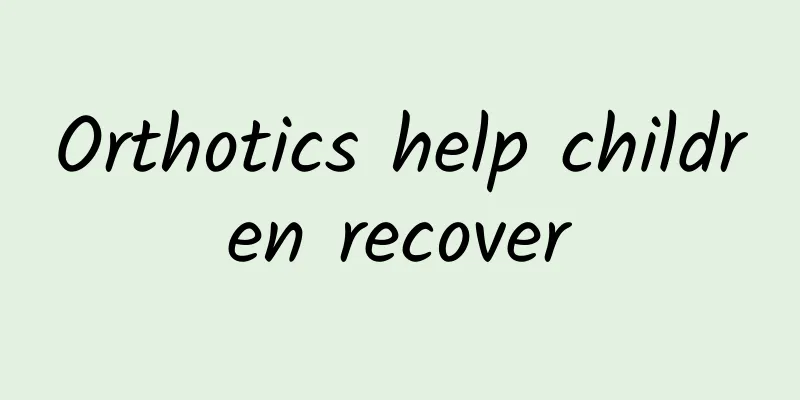Orthotics help children recover

|
What are orthotics? Orthotics belong to rehabilitation engineering and are an important part of rehabilitation medicine. Orthotics use the principles and methods of engineering to compensate for the lost functions of individuals to make up for functional defects, so that the sick individuals can take care of themselves and return to society to the greatest extent possible. In addition to orthotics, rehabilitation engineering products also include various assistive devices, prostheses, lifting and transportation systems, environmental control systems and robots. What are the applications of orthotics in children's rehabilitation? 1. Application of orthotics in children’s neurological rehabilitation Common diseases in neurorehabilitation include: cerebral palsy, paraplegia, hemiplegia, peripheral nerve injury, spinal muscular atrophy, pseudohypertrophic dystrophy (DMD), etc. Children with these diseases often have neuromotor dysfunction, including excessive or low muscle tone, decreased muscle strength, poor motor and posture control, partial or complete loss of standing and walking functions, hand dysfunction, etc. Through targeted fitting of lower limb orthoses - foot orthoses, ankle-foot orthoses, knee-ankle-foot orthoses, paraplegic walkers, etc., children can be helped to prevent and correct lower limb deformities, reduce lower limb tension, provide stable support and protection, and restore standing and walking abilities. At the same time, the use of hand braces can prevent hand muscle atrophy, contracture and deformation, and can also provide assistance for hand movements and promote hand function recovery. Ankle Foot Orthosis AFO 2. Application of orthotics in children’s orthopedic rehabilitation 1. Applied to children's fracture rehabilitation There are also many diseases that can be treated with orthotics in orthopedic rehabilitation. For example, fractures of the limbs or trunk can be fixed with low-temperature thermoplastic plates. Compared with traditional plaster fixation, low-temperature thermoplastic orthotics are not only well-fitting and well-fixed, but also light and breathable. If the fracture is relatively stable, it can be removed for local cleaning and care. It completely avoids the embarrassment of dry skin, bad odor, and hair hyperplasia caused by long-term plaster. Long leg orthosis Head, Neck and Thoracic Orthosis 2. Applied to the rehabilitation of congenital or acquired bone and joint deformities Children's bone development follows certain rules. For example, the arch of the foot is fully developed before the age of four, and the knee joint develops at around eight years old. The development of the spine is closely related to the bone age. The higher the bone maturity, the worse the treatment effect of scoliosis. If we can seize the golden time of children's development for conservative treatment, the effect will be ideal. Once we miss it, it may be counterproductive. Bone deformities suitable for early orthotic treatment include: scoliosis, equinus, flat feet, high arches, pigeon feet, X/O legs, and long and short legs. Remind parents and friends: Once the above abnormalities are found, even in the neonatal period, you should consult a doctor in time to avoid missing the best time for treatment. Abnormal human body alignment As an external device installed on the limbs, trunk and other parts of the human body, orthoses play an indispensable role in pediatric rehabilitation management. They can effectively prevent or correct deformities of the limbs and trunk or treat bone and joint and neuromuscular diseases and compensate for their functions. Through the organic combination of rehabilitation treatment and rehabilitation engineering, it can achieve twice the result with half the effort. It should be reminded that orthoses must be tailored by rehabilitation doctors, orthopedic doctors and orthotists after consultation. There must be a wearing plan, efficacy tracking, correction and replacement strategy, otherwise it may be counterproductive. |
<<: How much do you know about meniscus?
Recommend
Diet therapy for polyps in the uterus
In fact, nowadays female friends don’t pay much a...
Bleeding at 4 months of pregnancy
If bleeding occurs during the fourth month of pre...
Is it better to use chicken powder or MSG when cooking? Is it harmful to the body if consumed for a long time?
Chicken bouillon and MSG For some people (such as...
How to cure fallopian tube adhesions the fastest
The fallopian tubes on both sides are very import...
What is poppy? What is its function?
Papaver rhoeas is an annual herb native to Europe...
Female belly button left side dull pain
There are many reasons for the dull pain on the l...
Do people need to sweat after a full month of abortion?
After an abortion, a woman’s body is very weak an...
This invisible "health killer" is something many people suffer from every day.
This invisible "health killer" is somet...
When is the most accurate pregnancy dream?
For every pregnant mother, pregnancy is a happy a...
Menstruation delayed for more than ten days without pregnancy
Menstruation usually comes at a fixed time, and o...
Tidio AI: Survey shows that about 42% of respondents can accept robot companions
In a survey of more than 1,200 people, Tidio foun...
What should I do if my waist gets cold during the confinement period?
After giving birth, women are very weak and need ...
How about weight loss pills during lactation
Giving birth is something every woman has to go t...
Why does this test lead to a significant difference in the 5-year survival rate of patients diagnosed with lung cancer?
Lung cancer has the highest incidence and mortali...
How to relieve stomach pain in late pregnancy?
The physical health of pregnant women is very imp...









